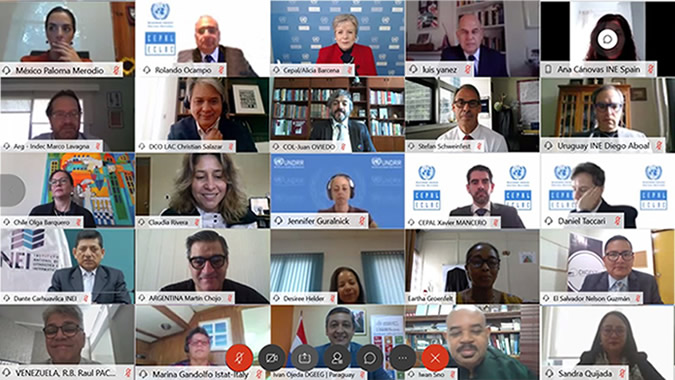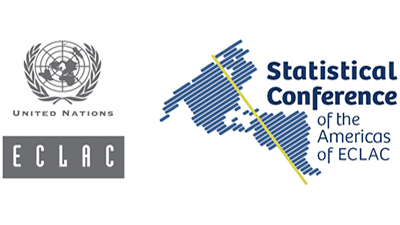Countries Stress the Importance of Statistics for Raising the Visibility of the Vulnerabilities and Major Inequalities that Characterize the Region
Work area(s)
The Nineteenth Meeting of the Executive Committee of the Statistical Conference of the Americas (SCA) was inaugurated today with a call to strengthen the role of national statistical offices in order to tackle the challenges of COVID-19.

Representatives of Latin American and Caribbean countries stressed today the importance of statistics for raising the visibility of the vulnerabilities and major inequalities that characterize the region, and called for strengthening the role of national statistical offices to confront the challenges imposed by the coronavirus (COVID-19) pandemic.
The Nineteenth Meeting of the Executive Committee of the Statistical Conference of the Americas of the Economic Commission for Latin America and the Caribbean (ECLAC) was inaugurated by Alicia Bárcena, ECLAC’s Executive Secretary; Juan Daniel Oviedo, Director-General of the National Administrative Department of Statistics (DANE) of Colombia, in his capacity as Chair of SCA-ECLAC; and Stefan Schweinfest, Director of the United Nations Statistics Division.
Participating in the gathering – which will run through August 27 – are 39 delegations from ECLAC’s Member States and 11 associate members.
In her remarks, Alicia Bárcena warned that the COVID-19 pandemic has exposed and accentuated the social problems that unfortunately characterize our region, such as poverty and inequality.
She specified that poverty will rise 37.3%, affecting 231 million people, and some 98 million people will live in extreme poverty (15.5%). Furthermore, ECLAC forecasts greater inequality in income distribution in all of the region’s countries: the Gini index is seen increasing between 1% and 8% in the 17 countries studied.
“The pandemic has clearly shown that inequality, a problem that ECLAC has insisted on repeatedly for more than a decade, is not only to be found in academic or technical discourse but instead has concrete and degrading consequences in people’s lives,” ECLAC’s Executive Secretary sustained.
She added that the precariousness of social protection systems has left millions of people adrift who, faced with the termination of their jobs, have had to resort to other alternatives for subsistence, unable to respect social distancing measures and exposing themselves to the pandemic’s risks.
In this context, she urged countries to continue moving towards more comprehensive ways of measuring well-being and of rendering social gaps visible through statistical information disaggregated by characteristics such as gender, ethnicity, age group, place of residence and disabilities, so as to leave no one behind.
“We need to create instruments that account for the perceptions that people have about their own well-being and experiences and incorporate subjective elements into our notion of well-being. We must have a more complete measurement of people’s income and wealth, in order to institute better public policies for reducing inequality in economic resources. We need to make progress on information systems that integrate statistics with geography and would enable us to visualize where the phenomena that interest us are taking place,” Alicia Bárcena emphasized.
Moreover, ECLAC’s highest authority warned that the pandemic has increased the risk of not achieving compliance with the Sustainable Development Goals (SDGs), which was already showing uneven progress in the region. According to an analysis of 72 statistical series of the 17 SDGs’ indicators for the region, it can be seen that 4 targets have been met; there are 15 that will likely be fulfilled, based on the current trend; 8 need more public policy intervention; 13 require strong public policy intervention; 27 are at a standstill; and 5 are suffering setbacks, she stated.
In the case of Caribbean countries, the pandemic is occurring at a time when they already face major challenges for achieving the SDGs, due to their greater vulnerability to external crises and high levels of indebtedness, combined with greater exposure to climate change and external climate events, which means that additional efforts beyond what has already been done will be required.
Alicia Bárcena noted that, for follow-up on the SDGs, ECLAC has created the Regional knowledge management platform for the Sustainable Development Goals (SDG Gateway), which has the aim of serving as a meeting and reference point for all information related to the SDGs, including activities, informational resources, statistics, regional data, specific analytical instruments and knowledge products developed and made available by the United Nations in response to member countries’ needs.
Juan Daniel Oviedo, meanwhile, underscored that the Statistical Conference of the Americas (SCA) is turning 20 years old and, under ECLAC’s leadership, has become a catalyzer of the modernization of statistical offices and of innovation in statistical production in the region.
“Joint work by the countries of Latin America and the Caribbean becomes critical for taking advantage, as a region, of the opportunity provided by quality, objective and relevant statistical information that would enable us, in the framework of the SCA, to orient the revitalization of our countries’ social, productive and environmental fabrics in the context of the ‘new normal,’” he indicated.
In his remarks, Stefan Schweinfest, Director of the United Nations Statistics Division, congratulated Latin America and the Caribbean’s statistical offices for remaining united during the pandemic and stressed that international cooperation is more important now than ever.
He emphasized that the region inspires the rest of the world due to the integration of statistical and geospatial information, which, in the midst of the pandemic, enables us to know not only how many people are infected, but also where they are located.
“All crises are an opportunity. This is definitely a time for data,” he stated.
At the Nineteenth Meeting of the SCA’s Executive Committee, the participants will analyze the challenges of COVID-19 as an opportunity to strengthen the role of national statistical offices, and they will discuss the role of national statistical offices as data stewards. They will also address the decade of action for the Sustainable Development Goals and review progress on implementation of the SCA’s Biennial Program of Regional and International Cooperation Activities 2020–2021.
Related event

Eleventh meeting of the Statistical Conference of the Americas of ECLAC
This eleventh meeting of the SCA-ECLAC, as well as the side-events will be held virtually.
Related content

Nineteenth meeting of the Executive Committee of the Statistical Conference of the Americas of ECLAC
This Nineteenth meeting of the Executive Committee of the SCA as well as the side-events were held virtually.
Related link(s)
Country(ies)
- Latin America and the Caribbean
Contact
Public Information Unit
- prensa@cepal.org
- (56 2) 2210 2040
